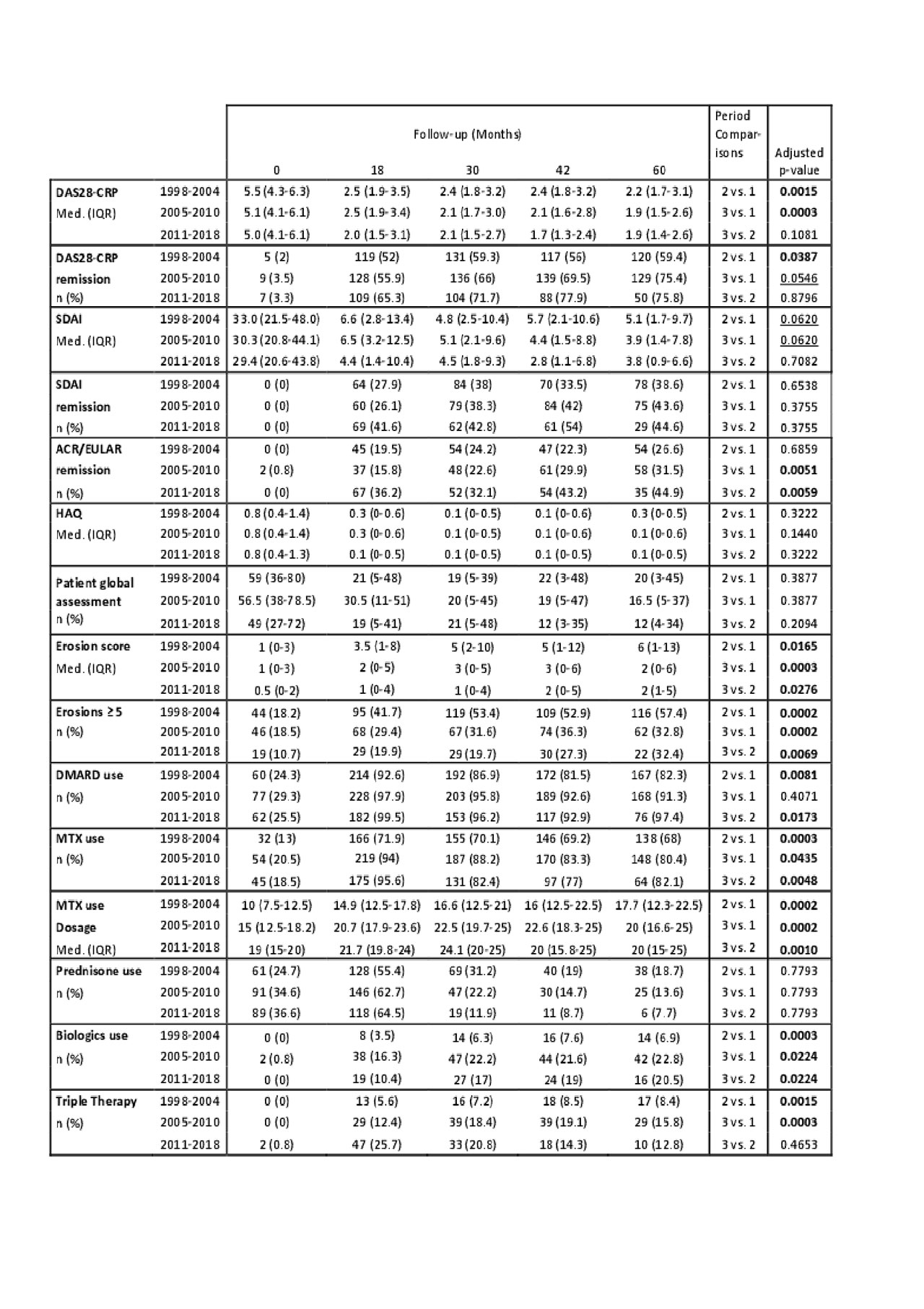Session Information
Date: Tuesday, November 12, 2019
Title: 5T114: RA – Diagnosis, Manifestations, & Outcomes IV: Outcomes (2846–2851)
Session Type: ACR Abstract Session
Session Time: 4:30PM-6:00PM
Background/Purpose: To analyze the evolution over 20 years of disease activity, treatments and radiographic progression over the first 5 years of follow up of patients with incident RA.
Methods: Since July 1998, the Early Undifferentiated PolyArthritis (EUPA) cohort recruited consecutive adults with recent-onset immune-mediated synovitis affecting at least 3 joints. From the start, patients were treated aiming at 0 swollen joint. Outcomes over 5 years were compared in patients fulfilling RA criteria according to date of inclusion (Period 1: 1998-2004; Period 2: 2005-2010; Period 3: 2011-2018). Disease activity was measured according to DAS28-CRP and SDAI; remission was also studied according to ACR/EULAR criteria. Use of conventional DMARD treatments was defined as none, simple, double and triple; mean MTX dose and biologic DMARD use were also compared across periods. Erosive damage was scored according to Sharp/van der Heijde; erosive status was defined as ≥5 Erosion units. False discovery rate correction was used to adjust p-values for multiple comparisons.
Results: 753 patients were included: 247, 263 and 243 in Periods 1, 2 and 3, respectively. Over the 5 years of follow up, DAS-28 scores significantly decreased and the number of patients reaching DAS-28 remission increased between Periods 1 and 2 (RR(95%CI)= 1.14 (1.03-1.26), p=0.04) and Periods 1 and 3 (RR=1.13 (1.01-1.27), p=0.055), but not between Periods 2 and 3. SDAI remission was not significantly different between Periods; however, SDAI remission was reached earlier during Period 3. Nonetheless, ACR/EULAR remission was reached earlier and was significantly more frequent in Period 3 than in Periods 1 and 2 (RR=1.43 (1.14-1.79), p=0.005; RR=1.36 (1.10-1.68), p=0.006 respectively), but not between Periods 2 and 1. There were no significant differences in mean HAQ scores nor Patient Evaluation of disease activity between Periods. The use of combination DMARDs increased between Periods at each follow up visit, reaching a peak of 25.7% receiving triple therapy at 18 months during Period 3 (versus 5.6% and 12.4% during Periods 1 and 2). Mean MTX dosage increased significantly from Period 1 to Period 2 to Period 3. The use of biologic DMARDs markedly increased between Periods 1 and 2 (RR=3.27 (1.92-5.57), p< 0.001), but significantly decreased from Period 2 to 3 (RR=0.62 (0.41-0.93), p=0.02). The use of corticosteroids did not differ significantly between Periods. Erosive damage decreased significantly over each Period (Periods 2 versus 1: RR= 0.65 (0.53-0.81), p=0.002; Periods 3 versus 1: RR=0.42 (0.31-0.56), p=0.002; Periods 3 versus 2: RR=0.64 (0.46-0.88), p=0.007).
Conclusion: In this cohort of recent onset (mean 3.8 months) RA recruited over 20 years, we observed during the 2005-2011 Period, relative to 1998-2004, a marked improvement in control of disease activity and in erosive damage concomitant with use of higher doses of MTX, more combination DMARDs and more biologic DMARDs. The major changes observed after the 2011 launch of Treat-to-Target initiative, were faster control of disease activity and faster attainment of deep levels of remission, resulting in improved radiographic outcomes despite less frequent use of biologic DMARDs.
To cite this abstract in AMA style:
Carrier N, Roux S, Masetto A, deBrum Fernandes A, Liang P, Maoui M, Boire G. Outcomes over the First 5 Years of Follow up in a Very Early Rheumatoid Arthritis (RA) Cohort Recruited over 20 Years: Most of the Improvement Occurred Before the 2011 Implementation of Treat-to-Target (T2T) [abstract]. Arthritis Rheumatol. 2019; 71 (suppl 10). https://acrabstracts.org/abstract/outcomes-over-the-first-5-years-of-follow-up-in-a-very-early-rheumatoid-arthritis-ra-cohort-recruited-over-20-years-most-of-the-improvement-occurred-before-the-2011-implementation-of-treat-to-targe/. Accessed .« Back to 2019 ACR/ARP Annual Meeting
ACR Meeting Abstracts - https://acrabstracts.org/abstract/outcomes-over-the-first-5-years-of-follow-up-in-a-very-early-rheumatoid-arthritis-ra-cohort-recruited-over-20-years-most-of-the-improvement-occurred-before-the-2011-implementation-of-treat-to-targe/

